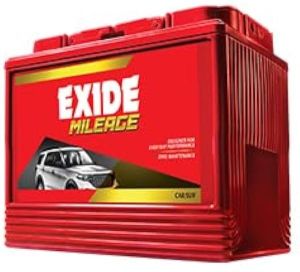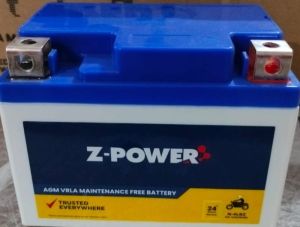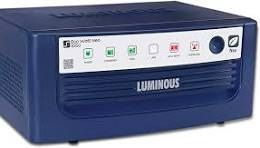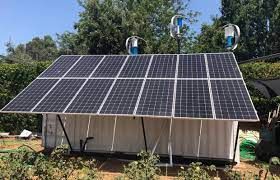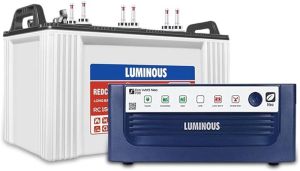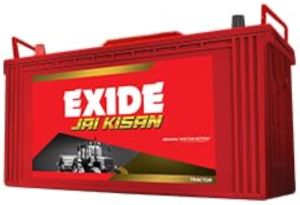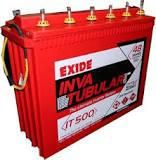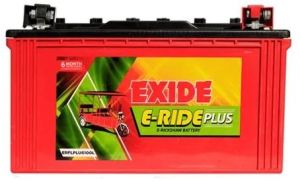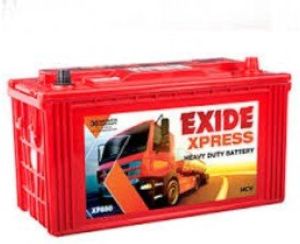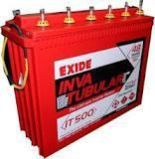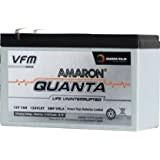Jaipur, Rajasthan
- GST NO. : 08ABDPM5660L1ZB
| Business Type | Exporter, Supplier, Trader |
| Brand Name | Exide |
| Condition | New |
| Application | Solar Battery |
| Click to view more | |
Preferred Buyer From
| Location | India ( Rajasthan only) & All other countries |
Product Details
Solar Batteries
Solar batteries, also known as solar energy storage systems or solar storage batteries, play a vital role in harnessing and maximizing the benefits of solar power. These batteries are crucial components of solar photovoltaic (PV) systems, which generate electricity from sunlight. These batteries store excess
electricity generated by solar panels during periods of sunlight, allowing users to utilize that stored energy when sunlight is not available, such as during nighttime or cloudy days. This capability enables a more consistent and reliable power supply from solar installations.
In contrast to automotive and industrial batteries, solar batteries serve a distinct purpose in energy storage. While automotive batteries are designed for short bursts of high power to start engines, and industrial batteries focus on providing consistent power for various heavy-duty applications, solar batteries prioritize efficient storage and retrieval of energy generated by solar panels. They are tailored for cyclic use, experiencing daily charge and discharge cycles. Solar batteries emphasize long-term reliability and sustainability, characteristics that differentiate them from the specific and often more demanding requirements of automotive and industrial batteries.
Types of Solar Batteries:
-
Lead-Acid Batteries: Traditional and cost-effective, lead-acid batteries are commonly used for solar energy storage. However, they may have shorter lifespans and require regular maintenance.
-
Lithium-Ion Batteries: Growing in popularity due to their high energy density, longer lifespan, and lower maintenance requirements. Lithium-ion batteries, including variations like lithium iron phosphate (LiFePO4), are commonly used in residential and commercial solar storage systems.
-
Flow Batteries: An emerging technology, flow batteries store energy in liquid electrolytes, offering advantages like scalability and longer cycle life. However, they are currently less common and more expensive.
Key Considerations:
-
Capacity: The storage capacity of a solar battery determines how much energy it can store. The right capacity depends on the user's energy needs and the intended duration of backup power.
-
Depth of Discharge (DoD): This indicates the percentage of a battery's capacity that can be used before recharging. A higher DoD allows for more usable energy but can impact the battery's lifespan.
-
Round-Trip Efficiency: This metric reflects how efficiently a solar battery can convert stored energy back into electricity. Higher efficiency ensures less energy loss during the charging and discharging processes.
-
Lifecycle: The number of charge and discharge cycles a solar battery can undergo before its capacity significantly degrades. Lithium-ion batteries often have longer lifecycles compared to lead-acid batteries.
Applications:
-
Residential Solar Systems: Solar batteries are used in conjunction with residential solar panels to store excess energy for nighttime or cloudy days, providing homeowners with a reliable and continuous power supply.
-
Commercial and Industrial Solar Installations: Large-scale solar installations for businesses and industries often incorporate solar batteries to enhance energy self-sufficiency and reduce reliance on the grid during peak demand periods.
-
Remote Off-Grid Systems: Solar batteries are essential in off-grid applications where there is no access to the electrical grid. This includes remote homes, cabins, and telecommunications towers.
BATTERY SAFETY AND HANDLING GUIDELINES
FOLLOW THESE BEST PRACTICES TO AVOID BATTERY ACCIDENTS
Please refer to your vehicle and battery owners’ manual to safely handle your lead-acid battery. Lead-acid batteries contain hydrogen-oxygen gases that can be explosive. Also, leakage of sulfuric acid can cause severe burns. Here are some precautions:
-
Wear safety glasses or goggles and a face shield
-
Make sure the work area is well-ventilated
-
Keep the battery out of children’s reach
-
Keep vent caps tight and level
-
In the event of an accident, flush with water and call a physician immediately
-
Never lean over the battery while boosting, testing or charging it
-
Keep all ignition sources like cigarettes, flames, and sparks that could cause the battery to explode away from it
-
Do not charge, use booster cables or adjust post connections without proper instructions and training
-
Avoid metallic contact across the terminals as this can result in short circuit and sparking (remove comma)
Safe disposal of old batteries
Govt. of India has notified Batteries Management Handling Rules, 2001 under the Environment Protection (Amendment) Act 1986 to channelize used lead acid batteries to registered/ authorized recyclers and ensure an environmentally safe & sound recycling.
The used batteries are carefully transported to respective manufacturers for the safe lead-recycle process, with no danger of air/water pollution. We are strongly committed to a safe and pollution-free environment.
Looking for "Solar Energy Batteries" ?
Explore More Products


